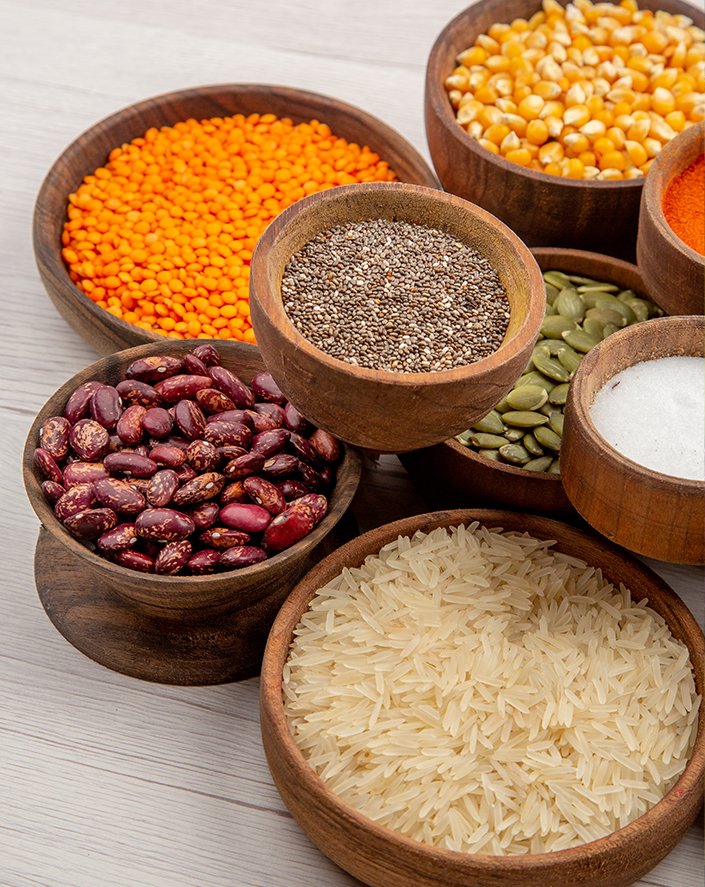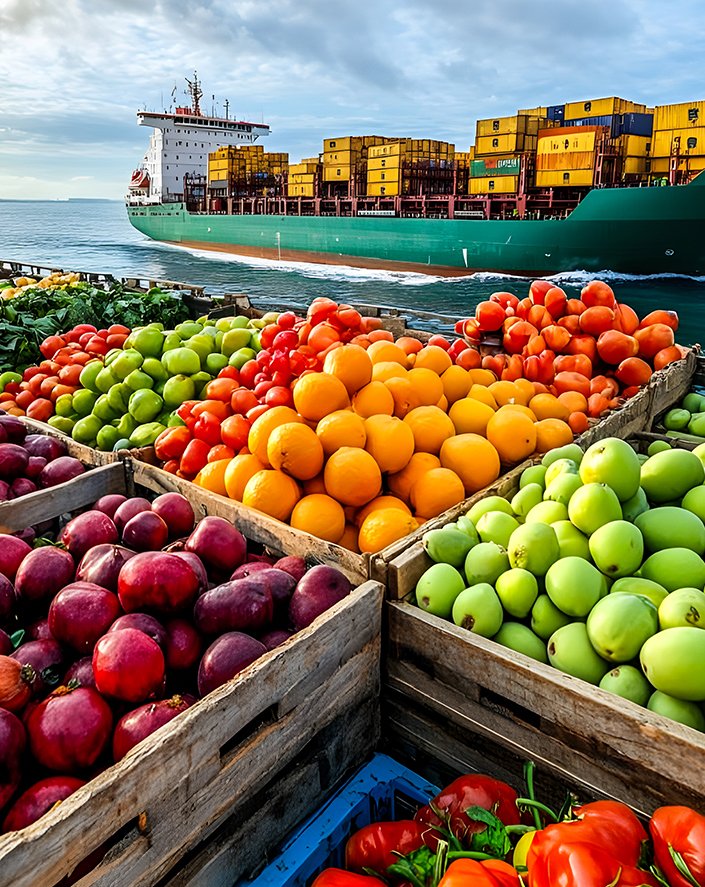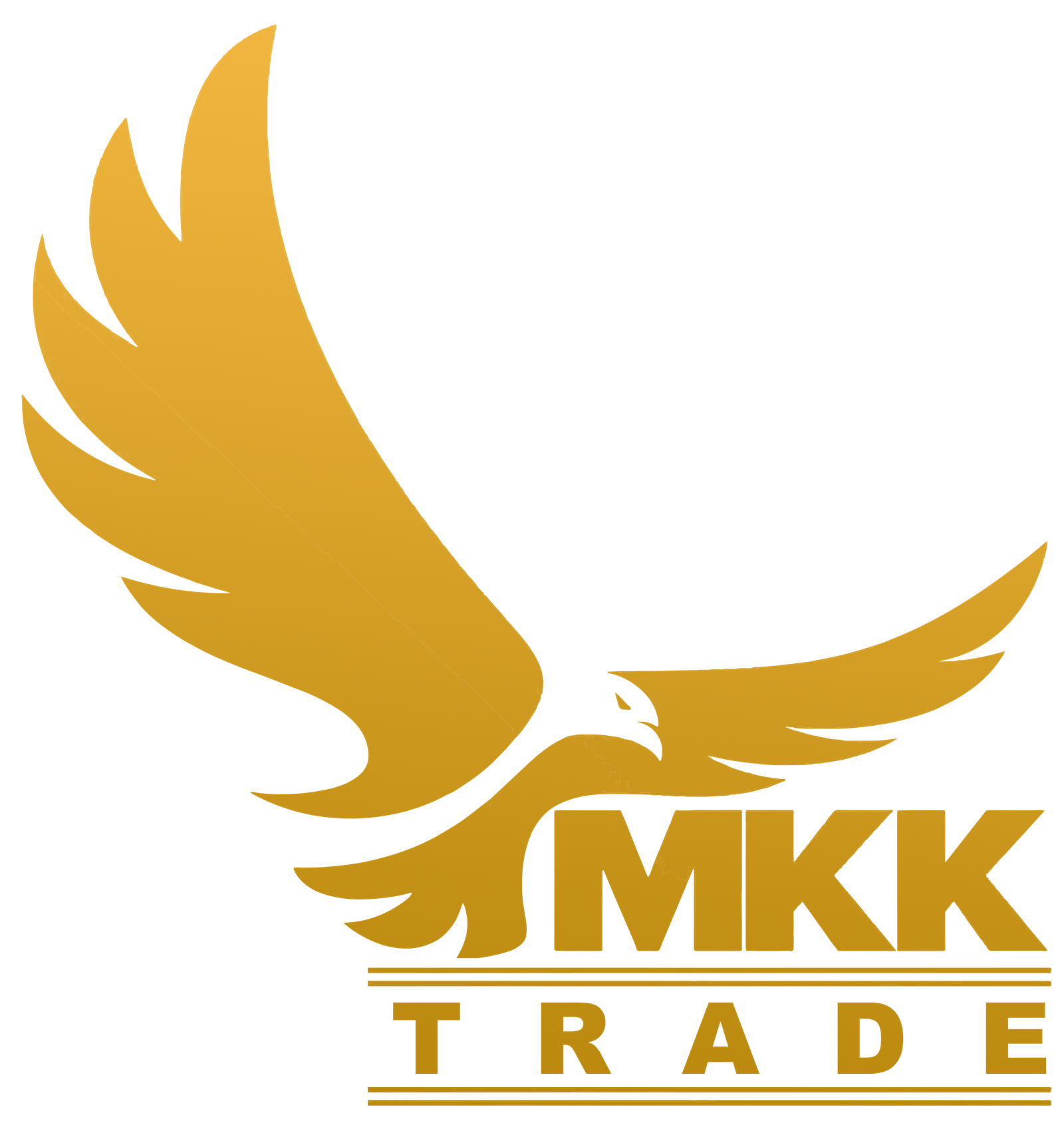Office #207-2nd Floor-ZALFA BUILDING-NEAR Jumeirah Creekside Hotel-Garhoud -Dubai UAE
Rice Exporter in UAE MKK TRADE –Your trusted UAE partner for premium rice exports, delivering quality, variety, and flavor to global markets!
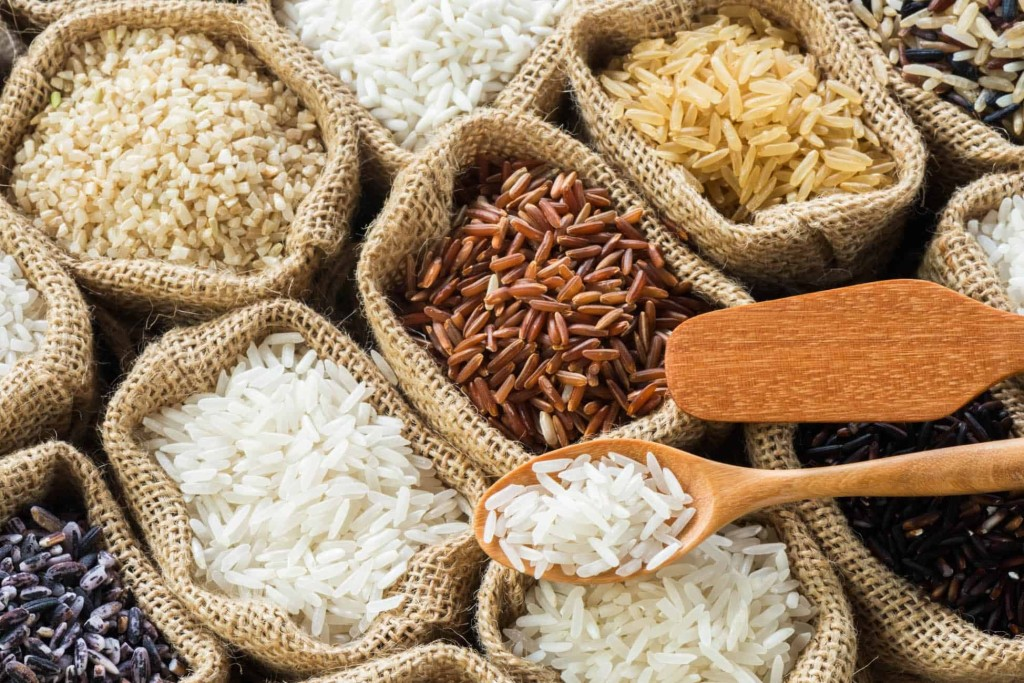
MKK TRADE is a rice exporter based in the UAE, involved in sourcing, processing, and exporting various types of rice to international markets. The company likely focuses on providing high-quality rice, such as Basmati or non-Basmati varieties, and caters to different regions, ensuring competitive pricing and adherence to international food safety standards. Exporters like MKK TRADE typically work with farmers and processors to ensure that their products meet the specific needs of their clients across the globe.
MKK TRADE plays a crucial role in the global rice market, particularly in the export of various rice types. The significance of MKK TRADE can be seen in multiple dimensions, from economic impacts to social benefits. As a supplier, MKK TRADE contributes to food security by providing a reliable source of staple food, which is vital for millions of people around the world. Rice is a fundamental part of diets in many countries, and MKK TRADE’s ability to export different varieties helps meet diverse culinary and nutritional needs. By ensuring the availability of high-quality rice, MKK TRADE supports not only consumers but also local farmers and economies in rice-producing regions.
Furthermore, MKK TRADE’s emphasis on sustainable practices enhances its significance in today’s environmentally conscious market. The company likely implements responsible sourcing methods and promotes sustainable farming techniques, which contribute to the long-term viability of rice cultivation. This approach not only addresses consumer demand for ethically sourced products but also aids in preserving ecosystems and promoting biodiversity. Additionally, MKK TRADE’s focus on quality assurance and adherence to international standards ensures that its rice meets the expectations of both domestic and international buyers, strengthening its reputation in the competitive global market.
MKK TRADE’s strategic partnerships and collaborations further amplify its significance. By working with local farmers and agricultural cooperatives, the company can foster community development and empower producers, enhancing their livelihoods. These partnerships often lead to improved farming techniques, increased yields, and better market access for farmers, which can have a positive ripple effect throughout local economies. As a result, MKK TRADE not only participates in global trade but also contributes to the socio-economic upliftment of communities involved in rice production, making its operations significant on both macro and micro levels.
Overall, MKK TRADE’s multifaceted contributions to the rice export market highlight its importance as a key player in promoting food security, sustainability, quality, and community development.
From the customer’s perspective, MKK Trade’s specialties in rice exporting can be seen as a combination of reliability, quality, and customer-focused services.
1. Wide Range of Rice Varieties
Customers appreciate the variety that MKK Trade offers. Whether they’re looking for basmati rice for its aromatic qualities, jasmine rice for its soft, sticky texture, or different types like long-grain or organic rice, MKK Trade provides options that suit various culinary needs. For customers, this range ensures they can source the exact type of rice their market or consumers prefer.
- Customer Benefit: Greater choice to meet diverse consumer tastes and regional demands.
2. High-Quality Assurance
For any customer buying rice in bulk or for resale, consistent quality is essential. MKK Trade’s commitment to high standards—whether through international certifications (e.g., ISO, HACCP) or rigorous quality control processes—gives customers peace of mind. They know that every shipment will meet specific standards for grain size, cleanliness, and moisture content.
- Customer Benefit: Assurance that they are getting premium quality rice, reducing the risk of complaints or returns.
3. Reliable and Sustainable Sourcing
In today’s environmentally conscious market, many customers value suppliers who prioritize sustainability. MKK Trade’s partnerships with local farmers and use of sustainable farming practices not only appeal to ethical buyers but also assure them of a consistent supply chain. This minimizes disruptions and provides a steady source of rice, especially important for businesses dependent on reliability.
- Customer Benefit: Ethical sourcing adds value to the end product and improves brand reputation for retailers or wholesalers.
4. Customized Packaging and Solutions
Different customers have different needs, and MKK Trade’s ability to customize packaging—from large bulk orders to retail-friendly smaller packages—provides flexibility. Customers might also appreciate MKK Trade’s ability to adapt to local preferences in packaging size, materials, and design, which ensures their shipments are market-ready upon arrival.
- Customer Benefit: Flexibility in packaging, making it easier to cater to various retail or wholesale markets.
5. Timely and Efficient Delivery
Efficient logistics are a hallmark of a trusted supplier, and MKK Trade excels in delivering rice on time. Customers appreciate timely shipments, which help them maintain inventory without unexpected delays. Reliable delivery schedules translate into smoother operations and predictable supply chain management for businesses.
- Customer Benefit: Peace of mind knowing that rice shipments will arrive on time, preventing inventory shortages and business disruptions.
6. Knowledgeable Market Expertise
MKK Trade’s in-depth knowledge of global markets and regulations is a key advantage for international customers. The company understands import/export regulations, tariffs, and food safety standards for various regions, making transactions smoother. This expertise also helps customers avoid the complications and costs associated with non-compliance.
- Customer Benefit: Simplified import processes and fewer regulatory headaches, ensuring smooth transactions and legal compliance.
7. Value-Added Services
In addition to selling rice, MKK Trade provides value-added services that enhance the overall experience. This could include responsive customer service, shipment tracking, and tailored advice on product selection or market trends. For customers, these services elevate MKK Trade from just a supplier to a trusted business partner.
- Customer Benefit: Access to personalized service and support, making the purchasing experience hassle-free.
8. Competitive Pricing and Payment Flexibility
MKK Trade’s competitive pricing, aligned with the quality of rice provided, ensures value for money. Additionally, offering flexible payment terms or financing options can ease the financial burden for buyers, particularly in emerging markets or regions with cash flow constraints.
- Customer Benefit: Affordability without compromising on quality, plus flexibility in payment options.
9. Transparency and Trust
Customers value transparency in the rice supply chain. MKK Trade’s use of technology for tracking shipments or ensuring traceability via blockchain can reassure buyers of the product’s origins and ethical practices. This transparency builds trust, especially for buyers needing to comply with stricter safety or ethical standards in their own markets.
- Customer Benefit: Transparency in sourcing and logistics, allowing customers to confidently market their products as high-quality and ethically sourced.
10. Focus on Health and Wellness Trends
Many consumers are increasingly health-conscious, and MKK Trade addresses this by providing nutritional information about their rice products. For buyers in health-focused markets, this adds significant value. The emphasis on organic, gluten-free, or fortified rice varieties appeals to customers looking for specialty products that meet the demands of health-conscious consumers.
- Customer Benefit: Ability to market health-forward rice products, meeting consumer trends and potentially attracting a premium market segment.
11. Responsive to Feedback and Customization
For many customers, the ability to provide feedback and have their needs met through customization is a critical aspect of their relationship with suppliers. MKK Trade’s customer-centric approach, which includes adjusting orders based on feedback or special requirements, fosters long-term relationships and builds brand loyalty.
- Customer Benefit: A supplier who listens and adapts, ensuring the product and service continually meet their evolving needs.
12. Innovative and Sustainable Packaging
MKK Trade’s focus on sustainable packaging options, such as biodegradable materials, aligns with the growing demand for eco-friendly products. This can give customers an edge, particularly in markets where sustainability is a key selling point. It also helps businesses comply with stricter environmental regulations that are becoming more common globally.
- Customer Benefit: Eco-friendly packaging options that appeal to environmentally conscious consumers and help meet regulatory requirements.
In summary, from a customer’s perspective, MKK Trade is seen as a reliable, flexible, and high-quality supplier of rice that goes beyond simply providing products. Their focus on customer satisfaction, product customization, sustainability, and supply chain efficiency builds trust and ensures long-term partnerships. Customers can rely on MKK Trade for superior service, competitive pricing, and adaptability to various market demands.
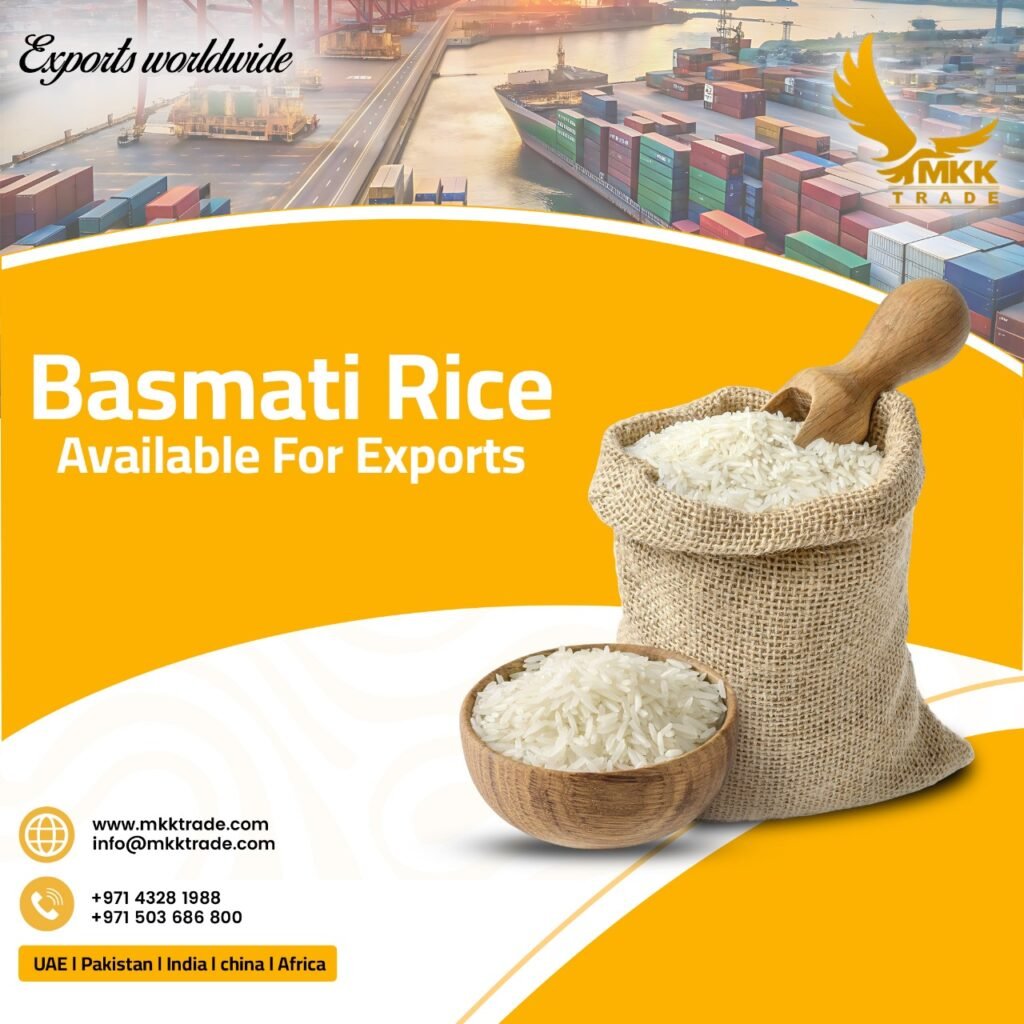
MKK TRDE, as a rice exporter based in the UAE, likely offers a diverse range of rice varieties tailored to meet the needs of international markets. Here’s a more detailed explanation of the types of rice they may provide for exporting:
1. Basmati Rice
- Description: Known for its long, slender grains and unique aroma, Basmati rice is a premium variety mainly cultivated in India and Pakistan. It is highly sought after for its distinctive flavor and fluffy texture when cooked.
- Uses: Popular in biryanis, pilafs, and other dishes where the fragrance and long grains are desired.
- Export Appeal: Considered a high-value product in many global markets, particularly in the Middle East, Europe, and North America.
2. Non-Basmati Rice
- Description: This category includes a wide range of rice types that do not fall under the Basmati classification. These may vary in size, shape, and aroma, catering to different culinary traditions.
- Examples: IR64, Sona Masoori, and Swarna rice varieties.
- Uses: Used in everyday meals, such as curries, stir-fries, and simple boiled rice preparations.
- Export Appeal: Often more affordable than Basmati rice, making it popular in regions where cost-efficiency is key, such as Africa and Southeast Asia.
3. Parboiled Rice
- Description: Parboiled rice is rice that has been partially boiled while still in the husk. This process makes the rice more nutritious by forcing some nutrients from the bran into the grain. It also results in firmer, less sticky grains when cooked.
- Uses: Ideal for dishes that require the rice to hold its shape, such as fried rice or stews.
- Export Appeal: Its longer shelf life and resilience during cooking make it popular in Africa, the Middle East, and Caribbean markets.
4. Sella Basmati Rice (Parboiled Basmati)
- Description: Sella rice is a parboiled version of Basmati rice, which maintains its long grain and fragrance but with a slightly firmer texture due to the parboiling process.
- Uses: Used in premium restaurant settings for biryanis, pulao, and other dishes that require rice with separate grains.
- Export Appeal: Sella Basmati is highly favored in Middle Eastern markets due to its superior texture and versatility in rice dishes.
5. Brown Rice
- Description: Brown rice is a whole grain that retains its bran layer, offering more fiber, vitamins, and minerals compared to white rice. It has a nutty flavor and a chewier texture.
- Uses: Preferred in health-conscious diets, often used in salads, grain bowls, and health-focused cuisines.
- Export Appeal: Increasing global demand for healthy and whole foods has boosted the popularity of brown rice, especially in Europe and North America.
6. White Rice
- Description: This is the most common variety of rice, with the bran and germ layers removed, resulting in polished, white grains. It is versatile, quick to cook, and has a neutral taste.
- Uses: Suitable for a wide range of dishes, from daily meals to elaborate cuisines.
- Export Appeal: Its widespread appeal makes it a staple in markets worldwide, especially in Asia, Latin America, and Africa.
7. Jasmine Rice
- Description: Jasmine rice is a fragrant long-grain rice, mainly cultivated in Thailand and other Southeast Asian countries. It is known for its floral aroma and slightly sticky texture when cooked.
- Uses: Popular in Southeast Asian cuisine, especially for serving with curries, stir-fries, and grilled meats.
- Export Appeal: Jasmine rice has a loyal market, especially in the United States, Europe, and other regions that favor Southeast Asian cuisine.
8. Glutinous (Sticky) Rice
- Description: Also known as sticky or sweet rice, this variety becomes sticky when cooked due to its high starch content. Despite its name, it contains no gluten.
- Uses: Primarily used in Asian desserts and savory dishes, such as sushi, rice cakes, and dumplings.
- Export Appeal: Preferred in East Asian and Southeast Asian markets for traditional dishes and special occasions.
UAE rice export companies Basmati rice exporter UAE Jasmine rice exporter UAE Long grain rice exporter UAE Rice wholesale suppliers UAE Exporting rice from UAE UAE rice trading Organic rice exporter UAE Premium rice exporter UAE Best rice exporters in Dubai Rice import-export services UAE Global rice market UAE Rice sourcing in UAE Rice distribution companies UAE Middle East rice suppliers Rice export logistics UAE Quality rice exporters UAE Rice supply chain MKK Trade, like many exporters, likely employs a range of strategies to effectively export rice. While specific details may vary based on market conditions, target regions, and company objectives, here are some common strategies they might consider: Market Research and Analysis: Conduct thorough research to identify demand trends in various international markets. Analyze competitor strategies to find gaps and opportunities. Quality Assurance: Ensure high-quality rice by adhering to international standards for grading, packaging, and labeling. Implement quality control measures throughout the supply chain to maintain consistency. Diverse Product Range: Offer a variety of rice types (e.g., basmati, jasmine, long-grain, short-grain) to cater to different consumer preferences. Rice Exporter in UAE Rice Exporter in UAE Rice Exporter in UAE Rice Exporter in UAE Rice Exporter in UAE Rice Exporter in UAE Rice Exporter in UAE Rice Exporter in UAE Rice Exporter in UAE Rice Exporter in UAE Rice Exporter in UAE Rice Exporter in UAE Rice Exporter in UAE Rice Exporter in UAE Rice Exporter in UAE Rice Exporter in UAE Rice Exporter in UAE Rice Exporter in UAE Rice Exporter in UAE Rice Exporter in UAE Rice Exporter in UAE Rice Exporter in UAE Rice Exporter in UAE Rice Exporter in UAE Rice Exporter in UAE Rice Exporter in UAE Rice Exporter in UAE Rice Exporter in UAE Rice Exporter in UAE Rice Exporter in UAE Rice Exporter in UAE Rice Exporter in UAE Rice Exporter in UAE Rice Exporter in UAE Rice Exporter in UAE Rice Exporter in UAE Rice Exporter in UAE Rice Exporter in UAE Rice Exporter in UAE Rice Exporter in UAE Rice Exporter in UAE Rice Exporter in UAE Rice Exporter in UAE Rice Exporter in UAE Rice Exporter in UAE Rice Exporter in UAE Rice Exporter in UAE Rice Exporter in UAE Rice Exporter in UAE Consider packaging options that appeal to various market segments, including bulk and retail packaging. Building Strong Relationships: Establish partnerships with local distributors and retailers in target markets to enhance market penetration. Attend trade shows and industry events to network and promote products. Logistics and Supply Chain Management: Optimize logistics to ensure timely delivery and reduce costs, including choosing the right shipping methods and partners. Maintain a robust supply chain to manage fluctuations in demand and supply. Regulatory Compliance: Stay updated on international trade regulations, tariffs, and import restrictions in target countries. Ensure compliance with food safety standards and certifications required by importing nations. Digital Marketing and E-Commerce: Utilize digital marketing strategies to promote products, including social media, SEO, and online advertising. Explore e-commerce platforms to reach a broader customer base and facilitate direct sales. Sustainability Practices: Implement sustainable farming and production practices to appeal to environmentally-conscious consumers. Highlight sustainable sourcing and fair trade practices in marketing materials. Adaptation to Local Tastes: Tailor products to meet the specific preferences of consumers in different regions, including flavors, packaging sizes, and branding. Customer Feedback and Improvement: Gather feedback from customers to continuously improve products and services. Be responsive to market changes and adapt strategies accordingly. By combining these strategies, MKK Trade can enhance its competitiveness in the global rice market and effectively meet the needs of its international customers. MKK Trade's strategies for exporting rice can be multifaceted, focusing on market dynamics, product quality, logistics, and customer engagement. Here’s a more detailed exploration of these strategies: 1. Market Research and Analysis MKK Trade begins its exporting strategy with in-depth market research. This includes analyzing global rice consumption trends, identifying potential markets, and understanding customer preferences. By investigating competitor practices, MKK can identify opportunities and differentiate its offerings. This research helps determine where to focus marketing efforts and which rice varieties might be in demand. 2. Quality Assurance Quality is paramount in food exports, and MKK Trade ensures that its rice meets international standards. This involves rigorous quality control processes during production, packaging, and transportation. By maintaining high-quality standards, MKK can build trust with buyers and establish a reputation for reliability in the global market. Additionally, obtaining relevant certifications (like ISO or HACCP) can enhance their credibility. 3. Diverse Product Range To cater to a wide array of international markets, MKK Trade offers various types of rice, such as basmati, jasmine, and long-grain varieties. This diversity allows them to meet the specific preferences of different regions. They may also provide options in packaging, ranging from bulk shipments for wholesalers to smaller retail packages that appeal to individual consumers. This adaptability is crucial for capturing diverse market segments. 4. Building Strong Relationships Establishing robust relationships with local distributors and retailers is vital for effective market penetration. MKK Trade actively seeks partnerships in target markets to facilitate distribution and enhance product visibility. Attending trade shows, exhibitions, and industry conferences enables MKK to network, forge new connections, and promote their rice products directly to potential buyers. 5. Logistics and Supply Chain Management Efficient logistics are essential for timely deliveries and cost management in exporting. MKK Trade focuses on optimizing its supply chain, selecting reliable shipping methods, and collaborating with reputable logistics partners. This ensures that products reach their destinations promptly and in good condition. Additionally, having contingency plans for supply chain disruptions helps mitigate risks associated with international trade. 6. Regulatory Compliance Exporting rice involves navigating complex regulations and standards in importing countries. MKK Trade keeps itself updated on the legal requirements for food safety, labeling, and tariffs in various markets. By ensuring compliance with these regulations, MKK can avoid costly penalties and delays, maintaining smooth operations in the international market. 7. Digital Marketing and E-Commerce In today’s digital age, MKK Trade harnesses online marketing to expand its reach. This includes utilizing social media platforms, search engine optimization (SEO), and online advertising to promote their rice products. They may also explore e-commerce channels to facilitate direct sales to consumers, broadening their customer base and enhancing accessibility. 8. Sustainability Practices With increasing consumer awareness of sustainability, MKK Trade emphasizes environmentally-friendly practices in its operations. This may involve sourcing rice from sustainable farms, employing eco-friendly packaging, and ensuring fair trade practices. Highlighting these efforts in marketing materials can attract environmentally-conscious consumers and differentiate MKK from competitors. 9. Adaptation to Local Tastes Understanding and adapting to local tastes is key for MKK Trade’s success in diverse markets. They may tailor their product offerings, packaging, and marketing messages to resonate with regional consumer preferences. This localized approach can enhance customer satisfaction and loyalty, leading to repeat business. 10. Customer Feedback and Improvement MKK Trade values customer feedback as a crucial tool for continuous improvement. By actively soliciting input from buyers, they can identify areas for enhancement in product quality, packaging, and service. This responsiveness not only helps in refining their offerings but also builds strong relationships with customers, fostering brand loyalty. In conclusion, MKK Trade's strategies for exporting rice are centered around a comprehensive understanding of market dynamics, a commitment to quality, and an emphasis on customer engagement. By implementing these strategies effectively, they can enhance their position in the global rice market and achieve sustainable growth. 11. Innovation in Packaging MKK Trade could invest in innovative packaging solutions that enhance product shelf life and appeal. Vacuum sealing, modified atmosphere packaging, and biodegradable materials can help maintain rice freshness while also appealing to eco-conscious consumers. Attractive branding and informative labeling can also help products stand out on store shelves. 12. Leveraging Technology Utilizing advanced technologies in logistics and supply chain management can streamline operations and reduce costs. Implementing systems for tracking shipments, inventory management, and demand forecasting can improve efficiency. Technologies like blockchain can enhance transparency in the supply chain, building trust with customers regarding product origin and quality. 13. Strategic Pricing MKK Trade can employ competitive pricing strategies to attract a broader customer base. By analyzing pricing trends in target markets and considering local economic conditions, MKK can offer competitive rates without compromising quality. Additionally, introducing tiered pricing based on product quality or volume can cater to different market segments. 14. Educational Marketing Providing educational content about the benefits and uses of different rice varieties can engage potential customers. MKK Trade could create recipes, cooking tips, and nutritional information that highlight their products' unique attributes. This content can be shared on social media, websites, and packaging, enhancing brand visibility and customer engagement. 15. Diversifying Export Markets To mitigate risks associated with relying on a few markets, MKK Trade could diversify its export destinations. Exploring emerging markets in Africa, Asia, or Latin America can provide new opportunities for growth. Tailoring marketing strategies to fit these new markets will also be crucial for success. 16. Building a Strong Online Presence Enhancing the company’s online presence through a professional website and active social media engagement can help attract new customers. Regularly updating content, sharing success stories, and showcasing the rice production process can foster a sense of connection and transparency with potential buyers. 17. Collaborating with Local Farmers Establishing partnerships with local farmers can enhance supply chain efficiency and quality control. By working directly with producers, MKK Trade can ensure that rice is grown sustainably and meets quality standards. Additionally, these collaborations can strengthen community ties and enhance the brand's reputation. 18. Export Financing Solutions Providing financing solutions for international buyers can facilitate transactions and attract more customers. MKK Trade could explore options such as offering credit terms or collaborating with financial institutions to provide trade financing. This can make purchasing easier for international customers, especially in markets where access to capital is limited. 19. Participation in International Trade Agreements MKK Trade should actively engage in international trade agreements that can provide favorable conditions for exporting rice. By understanding and leveraging agreements like free trade agreements (FTAs), the company can reduce tariffs and gain better market access. 20. Creating a Loyalty Program Implementing a loyalty program for regular customers can foster long-term relationships. Offering discounts, early access to new products, or exclusive promotions can encourage repeat purchases and strengthen customer loyalty. 21. Focus on Health and Wellness Trends As consumers become more health-conscious, MKK Trade can position its rice products as healthy and nutritious options. Highlighting the nutritional benefits of different rice varieties (such as whole grain or fortified options) in marketing materials can attract health-focused consumers. 22. Utilizing Feedback for Continuous Improvement Beyond just gathering customer feedback, MKK Trade can establish a formal process for incorporating that feedback into product development and service enhancements. This iterative approach ensures that the company remains responsive to market needs and continuously improves its offerings. 23. Crisis Management Planning Developing a robust crisis management plan is essential for navigating unexpected challenges, such as supply chain disruptions or market downturns. MKK Trade can prepare for potential crises by identifying risks, developing contingency plans, and ensuring clear communication with stakeholders. 24. Engaging in Corporate Social Responsibility (CSR) Implementing CSR initiatives can enhance MKK Trade's brand image and appeal to socially conscious consumers. This could involve community support programs, sustainable farming practices, or efforts to improve local farmers' livelihoods. Promoting these initiatives can differentiate the brand and foster goodwill. 25. Exploring Value-Added Products In addition to exporting raw rice, MKK Trade could explore opportunities to develop and export value-added products, such as rice flour, rice bran oil, or pre-cooked rice. These products can diversify revenue streams and attract different customer segments. By implementing a combination of these strategies, MKK Trade can enhance its competitive advantage in the rice export market, adapt to changing consumer preferences, and position itself for long-term success. MKK Trade specializes in exporting a wide range of rice varieties to cater to the diverse demands of global markets. One of the most popular types they likely export is Basmati rice, renowned for its long grains and fragrant aroma. Basmati rice is a staple in South Asian and Middle Eastern cuisines, especially in countries like India, Pakistan, UAE, and Saudi Arabia. Its unique texture and flavor make it highly sought after for dishes such as biryani and pilaf. For customers looking for an aromatic rice option, Basmati is often the top choice. Another variety that MKK Trade might export is Jasmine rice, a fragrant and slightly sticky rice primarily used in Southeast Asian dishes, such as Thai curries and stir-fries. Jasmine rice is appreciated for its softness and its ability to absorb flavors, making it a preferred choice for consumers in Thailand, Cambodia, and even global markets that enjoy Asian cuisine. For markets that require more everyday rice varieties, MKK Trade likely exports long-grain white rice. Known for its non-sticky texture, this rice remains separate after cooking, making it ideal for dishes like fried rice or rice salads. It’s a common choice in regions like Latin America, the USA, and many African countries where long-grain rice is favored for its versatility and light texture. In addition, MKK Trade may offer short-grain rice, which is popular in East Asian cuisines, especially for dishes like sushi or rice porridge. Its sticky texture makes it a staple in Japan and Korea, where the rice needs to hold together for specific culinary traditions. Parboiled rice is another variety that MKK Trade might export. This type of rice is partially boiled in the husk, which preserves nutrients and results in firmer, non-sticky grains. Parboiled rice is highly favored in West African, Middle Eastern, and Latin American markets because of its ease of preparation and nutritional benefits. For health-conscious markets, brown rice is an important offering from MKK Trade. Retaining its bran layer, brown rice is considered a whole grain and is popular in North America, Europe, and parts of Asia due to its high fiber and nutritional value. MKK Trade likely also caters to niche markets with glutinous rice (sticky rice), primarily used in East and Southeast Asia. This rice is ideal for making desserts or traditional sticky rice dishes in countries like China, Japan, and Thailand. Additionally, with the growing demand for healthier food options, organic rice might be a key product in MKK Trade's portfolio. Organic rice, grown without synthetic fertilizers or pesticides, is gaining popularity in regions like Europe and North America, where consumers are more focused on environmentally friendly and chemical-free food products. Finally, fortified rice could be another specialty for MKK Trade, catering to countries focused on addressing nutritional deficiencies. This rice, enriched with essential vitamins and minerals, can be an essential product in areas where malnutrition is a concern. MKK Trade might also specialize in exporting specialty rice varieties, such as red, black, or wild rice, which appeal to gourmet markets looking for unique textures and flavors. Each of these rice varieties allows MKK Trade to meet the specific needs of different regions, making them a versatile and reliable exporter in the global rice market.
